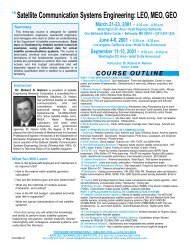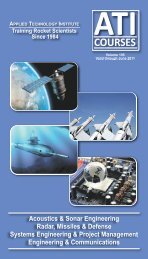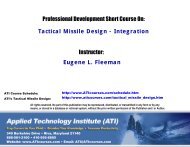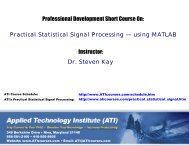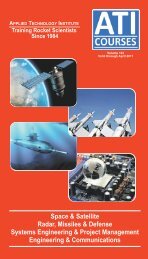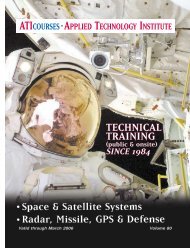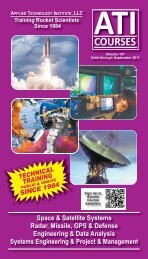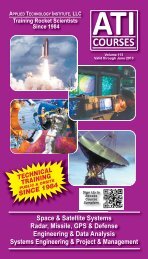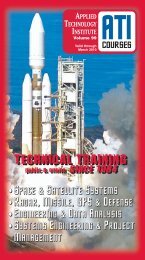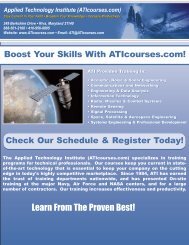Synthetic Aperture RadarCourse # D244 - D243FundamentalsAdvancedFebruary 9-10, 2015Columbia, Maryland$1190 (8:30am - 4:00pm)What You Will Learn• Basic radar concepts and principles.• SAR imaging and approaches to SAR processing.• Basic SAR system engineering and design tradeoffs.• Survey of existing SAR systems.• Coherent and Non-Coherent SAR Exploitation includingbasic interferometry,February 11-12, 2015Columbia, Maryland$1190 (8:30am - 4:00pm)What You Will Learn• SAR system design and performance estimation.• Interactive SAR design session illustrating design tradeoffs.• SAR Polarimetry.• Advanced SAR Interferometry including PS InSAR.• Survey of future applications and system.InstructorRichard Carande is the President, CEO and co-founder of Neva Ridge Technologies, a company located in Boulder Coloradothat specializes in SAR and SAR exploitation technologies. Prevously, Mr. Carande was the Vice President and Director ofAdvanced Radar Technologies at Vexcel Corporation. From 1986 to 1995 Mr. Carande was a group leader for a SAR processordevelopment group at the Jet Propulsion Laboratory (Pasadena California). There he was involved in developing an operationalSAR processor for the JPL/NASA’s three-frequency, fully polarimetric AIRSAR system. Mr. Carande also worked as a SystemEngineer for the Alaska SAR Processor while at JPL, and performed research in the area of SAR Along-TrackInterferometry. Before starting at JPL, Mr. Carande was employed by a technology company in California where he developedoptical and digital SAR processors for internal research applications. Mr. Carande has a BS & MS in Physics from Case WesternReserve University.Course Outline1. Fundamentals of Radar. This portion of the course will providea background in radar fundamentals that are necessary for theunderstanding and appreciation of synthetic aperture radar (SAR) andproducts derived from it. We will first review the history of radartechnology and applications, and introduce some fundamentalelements common to all radar systems. The student will learn howbasic ranging radar systems operate, why a chirp pulse is commonlyused, the Radar Range Equation and radar backscattering. We willalso discuss common (and uncommon) radar frequencies(wavelengths) and their unique characteristics, and why one frequencymight be preferred over another. A high-level description of radarpolarization will also be presented.2. SAR Imaging. An overview of how SAR systems operate will beintroduced. We will discuss airborne systems and spaceborne systemsand describe unique considerations for each. Stripmap, spotlight andscanSAR operating modes will be presented. The advantages of eachmode will be described. A description of SAR image characteristicsincluding fore-shortening, layover and shadow will be shown. Rangeand azimuth ambiguities will be presented and techniques formitigating them explained. Noise sources will be presented. Equationsthat control system performance will be presented including resolution,ambiguity levels, and sensitivity. Approaches to SAR image formationwill be described including optical image formation and digital imageformation. Algorithms such as polar formatting, seismic migration,range-Doppler and time-domain algorithms will be discussed.3. Existing and future SAR systems. We will describe the suiteof SAR systems currently operating. These will include all of thecommercial spaceborne SAR systems as well as common airbornesystems. Key features and advantages of each system will bedescribed. A description of upcoming SAR missions will be provided.4. SAR Image Exploitation. In this section of the class a numberof SAR exploitation algorithms will be presented. The techniquesdescribed in this session rely on interpretation of detected images andare applied to both defense and scientific applications. A high-leveldescription of polarimetric SAR will be presented and the uniquecapabilities it brings for new applications. (More polarimetry detail canbe found in the ATI Advanced SAR course.)5. Coherent SAR Exploitation. The coherent nature of SARimagery will be described and several ways to exploit this uniquecharacteristic will be presented. We will discuss the “importance ofphase,” and show how this leads to incredible sensitivities. Coherentchange detection will be described as well as basic interferometricapplications for measuring elevation or centimeter-level groundmotion. (More detail on interferometry can be found in the ATIAdvanced SAR course.)Course Outline1. SAR Review. A brief review of SAR technology, capabilities andterminology will set the stage for this Advanced SAR Class.2. SAR System Engineering and Performance Prediction. Thefactors that control the quality of SAR imagery produced from a givensystem will be developed and presented. This includes noiseequivalentsigma zero (sensitivity) calculations, trade-offs in terms ofresolution verses coverage, and the impact of hardware selectionincluding radar echo quantization (ADCs), antenna area and gain.Parameters that affect PRF selection will be described and anomogrammatic approach for PRF selection will be presented.Specialized techniques to improve SAR performance will be described.3. Design-A-SAR. Using an ideal implementation of the radarequation, we will design a simplified SAR system and predict itsperformance. During this interactive session, the students will selectradar “requirements” including radar frequency, coverage, resolution,data rate, sensitivity, aperture size and power; and the systemperformance will be determined. This interactive presentation of designtrade-offs will clearly illustrate the challenges involved in building arealistic SAR system.4. SAR Polarimetry. We will first review polarimetric SAR principlesand described single-pol, dual-pol and quad-pol SAR systems and howthey operate. Hybrid and compact polarimetry will also be described.Polarization basis will be presented and we will discuss why one basismay be more useful than another for a particular application.Examples of using polarimetric data for performing SAR imagesegmentation and classification will be presented includingdecomposition approaches such as Cloud, Freeman-Durden andYamaguchi. Polarimetric Change detection will be introduced.5. Advance SAR Interferometry. Techniques that exploit mutuallycoherent acquisitions of SAR data will be presented. We will firstreview two-pass interferometric SAR for elevation mapping and landmovement measurements. This will be expanded to using multipleobservations for obtaining time series results. Model-based methodsthat exploit redundant information for extracting unknown troposphericphase errors and other unknown noise sources will be presented (e.g.Permanent Scatterer Interferometry). Examples of these data productswill be provided, and a description of new exploitation products thatcan be derived will be presented.6. Future and potential applications and systems. A survey ofcurrent work going on in the SAR community will be presented, andindications as to where this may lead in the future. This will include anoverview of recent breakthroughs in system design and operations,image/signal processing, processing hardware, exploitation, datacollection and fusion.Register online at www.ATIcourses.com or call ATI at 888.501.2100 or 410.956.8805 Vol. 114 – 2626 – Vol. 119 Register online at www.ATIcourses.com or call ATI at 888.501.2100 or 410.956.8805
Unmanned Air Vehicle DesignCourse # D261November 11-13 2014Dayton, OhioFebruary 17-19 2015Columbia, Maryland$1895 (8:30am - 4:30pm)"Register 3 or More & Receive $100 00 eachOff The Course Tuition."SummaryThis three-day short course covers the design ofunmanned air vehicles. The course will cover thehistory and classes of UAVs, requirement definition,command and control concepts and UAV aircraftdesign. It provides first-hand understanding of theentire design and development process for unmannedvehicles from their involvement in the DARPA MAVdevelopment and as the lead for the Army’s BrigadeCombat Team Modernization Class I, Increment Twovehicle. The instructor is currently working towards firstflight and was a key contributor to requirementsdevelopment, conceptual design, design optimization.UAV’s history will be covered and the lessonslearned and the breadth of the design space. UAV’s areand will be key components of aviation. From the nanosized flapping vehicles to the extreme duration of highaltitude surveillance vehicles.Each student will be provided a hard copy of thepresentations and the text book, Fundamentals ofAircraft and Airship Design: Volume I -Aircraft Design,by Leland M. Nicolai.InstructorMr. Paul Gelhausen is Founder, Managing Memberand Chief Technical Officer of an aerospace company.He holds a B.S. and M.S. degrees in AerospaceEngineering from the University of Michigan andStanford University, respectively. Mr. Gelhausenprovides technical managerial leadership in design,simulation, and testing of advanced ducted fan vehicleconfigurations as well as providing technical andmanagerial leadership in the definition of future vehiclerequirements to satisfy mission scenarios, functionaldecomposition, concept development and detailedsystems and technology analysis. Prior to founding thecompany Mr. Gelhausen was a former NASA LangleyEngineer where he led the configuration design,aerodynamic design and aerodynamic validationelements of the multi-center Mars Airplane Programincluding requirements generation, technicalspecifications,analysis planning, test planning andoverall management.Course Outline1. Introduction.• Brief history of UAV’s "How did toys become useful?"• Classes of UAV’s• Fixed Wing• Rotary Wing / VTOL• Micro2. UAV Requirements Definition.• Operational Concepts• Mission definition• Requirements Flow-down3. Command and Control Concepts.• Ground based operation• Autonomous operation• Systems and subsystems definition• System Safety and Reliability Concerns4. UAV Aircraft Design.• Configuration• Aerodynamics• Propulsion and propulsion system integrationconcepts• Structures• Performance• Flight Controls and Handling Qualities• Operational influences on control strategies• Vehicle analysis & how it affects control strategies• Make sure you have enough sensor bandwidth• Making sure you have enough control surfaces /power / bandwidth (choosing an actuator)• Gust rejection and trajectory performance driven by5. Case study Examples.• Case study 1: Large turbine design• Case study 2: Small piston engine design• Cost Analysis• Development• Manufacturing• Operations• Disposal• Design Tools• Design OptimizationWhat You Will Learn• UAV design is not a simple task that can be fullylearned in a short time, however, the scope of theproblem can be outlined.• The design process is similar to any aircraft design,but there are unique tasks involved in replacing theintelligence of the pilot.• The long history of UAV’s and the breadth of thedesign space will be covered.• Lessons learned from experience and byobservation will be shared in the course.• We will cover the tools and techniques that areused to make design decisions and modifications.• Representative practical examples of UAV will bepresented.Register online at www.ATIcourses.com or call ATI at 888.501.2100 or 410.956.8805 Vol. 119 – 27



